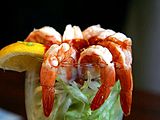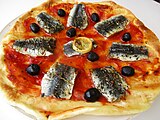| Pescetarianism | |
|---|---|
   | |
| Description | |
| A diet in which seafood is the only meat | |
| Related Dietary Choices | |
| Related diets | |
| Diet classification table | |
Pescetarianism (/ˌpɛskəˈtɛəri.ənɪzəm/ PESK-ə-TAIR-ee-ə-niz-əm; sometimes spelled pescatarianism)[1] is a dietary practice in which seafood is the only source of meat in an otherwise vegetarian diet.[2] The inclusion of other animal products, such as eggs and dairy, is optional. According to research conducted from 2017 to 2018, approximately 3% of adults worldwide are pescetarian.[3][4]
- ^ Luna, Taryn (1 July 2015). "Legal Sea Foods launches 'Pescatarianism' ad campaign". The Boston Globe. Archived from the original on 7 July 2015. Retrieved 6 July 2015.
- ^ "Pescetarianism | Description, Seafood, Vegetarianism, & Benefits | Britannica".
- ^ Cite error: The named reference
:2was invoked but never defined (see the help page). - ^ "An exploration into diets around the world" (PDF). Ipsos. UK. August 2018. pp. 2, 10, 11. Archived (PDF) from the original on 12 May 2019. Retrieved 12 May 2019.